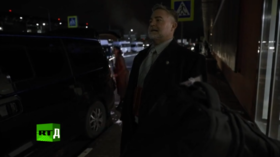Supreme Court blocks social media law

The US Supreme Court has ruled against a Texas law which effectively barred social media companies from moderating user content online, temporarily blocking the legislation as a major legal battle plays out between the state government and Big Tech lobbies.
In an opinion handed down on Tuesday, the court said it would grant a preliminary injunction against the Texas attorney general, prohibiting him from enforcing the law in question after a pair of major trade associations sued on allegations that it is “facially unconstitutional” under the First Amendment.
The law, dubbed HB20, states that large social media platforms may not “censor a user, a user's expression, or a user's ability to receive the expression of another person” under most circumstances, and was passed by Texas Republicans claiming that social media sites disproportionately target conservative users. After signing the bill, Governor Greg Abbott pointed to a “dangerous movement by social media companies to silence conservative viewpoints and ideas,” insisting “we will not allow it in Texas.”
While the court’s injunction is temporary and will merely block the law from being enforced as the legal clash unfolds, Big Tech lobbyists involved in the case have nonetheless cheered the decision.
“This ruling means that private American companies will have an opportunity to be heard in court before they are forced to disseminate vile, abusive or extremist content under this Texas law,” said Matt Schruers, president of the Computer and Communications Industry Association.
The association represents a who's-who of Big Tech and social media firms, among them Twitter, Facebook, Google, Amazon and Apple. Another lobbying group with a similar roster of major firms, NetChoice, is also taking part in the lawsuit.
While Tuesday’s opinion did not explain the justices’ reasoning, it did include a dissent from conservative Justice Samuel Alito, who stressed the importance of states’ rights against federal intrusion.
“While I can understand the Court's apparent desire to delay enforcement of HB20 while the appeal is pending, the preliminary injunction issued by the District Court was itself a significant intrusion on state sovereignty,” Alito wrote, referring to a previous ruling by a lower court. He added that “Texas should not be required to seek pre-clearance from the federal court before its laws go into effect.”
The ruling follows a similar decision by a US appeals court in May, which struck down a Florida law seeking to impose restrictions on social media companies and their moderation practices. Signed by Governor Ron DeSantis last year, the law would have enabled the state government to fine social media firms up to $250,000 per day, among other penalties, if they were found to have removed the account of a statewide political candidate. As with the Texas legislation, lobbying outfits NetChoice and the Computer and Communications Industry Association were both involved in challenging the Florida law.













